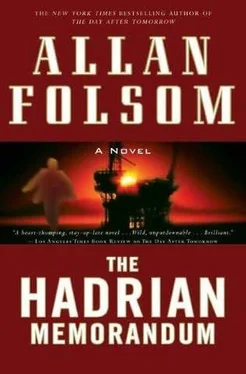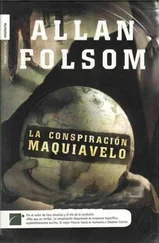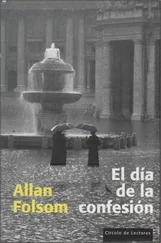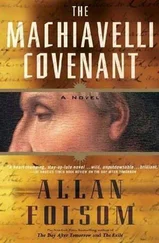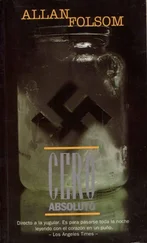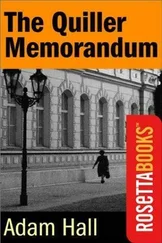“I won’t forget it.”
“We have a congressman to meet.”
“I know.”
He watched her for a heartbeat longer. “Let’s get to it,” he said finally, then turned the light and they moved on.
9:52 A.M.
FOUR SEASONS HOTEL RITZ. SAME TIME.
Joe Ryder and his RSO special agents, Tim Grant and Chuck Birns, sat alone wrapped in towels in the men’s sauna in the hotel’s spa. Grant and Birns had stood by as Ryder spent several minutes in the lap pool; then the three retired to the men’s changing room area and afterward into the sauna, where Ryder took the men into his confidence, telling them what was happening and what needed to be done.
By nothing more than coincidence, Special Agent Grant’s physical build was almost the same as Joe Ryder’s. Months ago and at the suggestion of a friend in the Secret Service, he had dyed his hair the color of Ryder’s and had it styled in the same manner, then bought a pair of the same kind of rimless glasses the congressman wore. When he put them on, he was very nearly Ryder’s double, and unless a person knew each man well, it would be hard to tell them apart, especially from a distance. It was a game Grant had no trouble in playing, and he had done it more than once in Iraq getting Ryder safely through potentially dangerous situations.
The plan was to act it out again here. Grant, wearing Ryder’s clothes, would leave the spa and take the elevator to the lobby, very publicly pick up a copy of the International Herald Tribune from a table near the concierge desk, then take the elevator up to Ryder’s suite. In the meantime, Ryder, dressed in Grant’s clothes, and Agent Birns would return to the pool area and exit through glass doors that opened onto a small formal garden. Crossing it, they would go down a short flight of steps, climb a low fence, and enter Eduardo VII Park. Afterward they would walk to the nearest street, hail a taxi, and ask the driver to take them to the Café Hitchcock in the Alfama district, the restaurant where Ryder had told Lisbon/RSO detail leader Anibal Da Costa he had planned to go for lunch.
Partway there they would tell the driver that they’d decided to do a little shopping before lunch and ask him to pull over. When he did, they would get out, wait for him to drive off, then immediately take another cab to Rua Serpa Pinto, getting out several blocks from the Hospital da Universidade and walking the rest of the way. In the meantime Agent Grant would have changed from Ryder’s clothes into jeans and a light jacket, gone down the back stairs and crossed into the park himself, then flagged down a cab and gone directly to the area where the hospital was. But he would use it only as a reference point for the driver, saying he was going to visit a friend on a street nearby where he had been before but whose exact name he couldn’t remember. When they reached the area he would arbitrarily choose a street, tell the driver to stop, and then get out, saying he would know the building when he saw it. Like the others, he would wait for the driver to leave, then find his way to the hospital on foot, meeting Ryder and Birns just inside the rear entrance. Hopefully close to the appointed 11:00 A.M.
9:59 A.M.
Ryder and Birns came out through the pool area doors, crossed the formal garden, went down the steps to the low fence, and climbed over it. Two minutes later they were in Eduardo VII Park walking under an umbrella of palm and conifer trees. Ryder wore Grant’s beige slacks, blue dress shirt, and light blue blazer. Birns wore a summer-weight tan business suit with a white shirt open at the collar. In his right hand was a briefcase. Inside it was a Heckler & Koch MP5K 9 mm compact submachine gun with a thirty-round clip and fitted with a laser sight. In the event of an attack all he needed to do was point the briefcase at his target; a red laser dot would spot on the subject. After that it was easy. Simply pull the trigger in the briefcase’s grip and let the weapon do its job.
10:02 A.M.
The two stepped out of the park where it met Rua Marguês de Fronteira. Less than thirty seconds later they saw a taxi coming toward them through traffic. Birns cautioned Ryder back, then stepped into the street to flag it down. The taxi sped past, then twenty yards later suddenly pulled over and stopped.
“Let’s go,” Ryder commanded.
10:04 A.M.
“You speak English?” Ryder asked as they climbed in.
The driver looked at them in the mirror and gave a cheery “Yes, sir.”
“Good. Café Hitchcock. In the Alfama district.”
“Of course, sir,” the driver said, and they drove off.
10:05 A.M.
The car was a black Mercedes S600 sedan with smoked glass windows and, as Conor White had asked, United Nations license plates. Their driver was a handsome young black man called Moses, from Algeria, he said. He had a 9 mm automatic pistol mounted in a clip under the dashboard. The car itself had a 510 horse power V12 engine. It could go from 0 to 60 in 4.5 seconds. Its top speed through narrow city streets was unknown.
Irish Jack had parked the gray BMW on a side street a block from the U.S. Embassy. Less than a minute later, at eight thirty-seven, Moses met them with the Mercedes. Conor White was dressed in a tailored pin-striped navy suit with a light blue French-cuffed shirt and a striped maroon tie fastened with a Windsor knot. Patrice and Irish Jack wore conservative blue suits, white shirts, and ties. Each man carried a hard-shell briefcase holding his primary weapon of choice. For Patrice and Irish Jack, highly modified 45 mm M-4 Colt Commando submachine guns with sound and flame suppressors. For Conor White, two modified MP5 submachine guns, also with sound and flame suppressors. Each man, too, carried a concealed sidearm beneath his suit coat. Burst-firing 9 mm Beretta automatic pistols for Patrice and Irish Jack. The short-barrel 9 mm SIG SAUER semiautomatic for Conor White.
All three wore team ratio units and constantly monitored the on-and-off banter between Carlos Branco’s men watching the building at number 17 Rua do Almada. So far their communication had been little more than idle chatter; nothing seemed to be happening. That fact alone made White increasingly nervous. What were Anne and Marten-by now he was convinced it was indeed Marten who had been seen entering the building at close to one in the morning-doing? Waiting for communication from Ryder? Planning something else? So far he had no sense of any of it. Ryder was under Branco’s personal observation. His electronic surveillance team monitoring communications to and from the apartment building had reported no transmittals or receptions they could attribute to either Anne or Marten.
By nine fifty Moses had made two passes down Rua do Almada. There had been no sign of police, just a few pedestrians, several people in the park, two of which had to be Branco’s men, and normal everyday traffic. The quiet had made White bold enough to want to go in right then and take care of business. The Mercedes sedan, the UN plates, the men inside dressed like diplomats. Even if the police came by on patrol, it would be easy enough to simply let them pass, then go inside, do what had to be done, and quietly leave. But doing so might somehow alert Joe Ryder and would put Branco in the situation of having to kill him himself. That, in turn, risked a firefight with Ryder’s personal RSO bodyguards. Something like that would be loud and messy, and who knew how it would turn out? So going in after Anne and Marten was not a reasonable option. All he could do was wait until they made their move and Ryder made his in an attempt to join them. What he had to do was have patience, something every soldier in every war ever fought had had to have. Hurry up and wait. It was the unwritten heart of les règles de guerre , the rules of war.
Читать дальше
